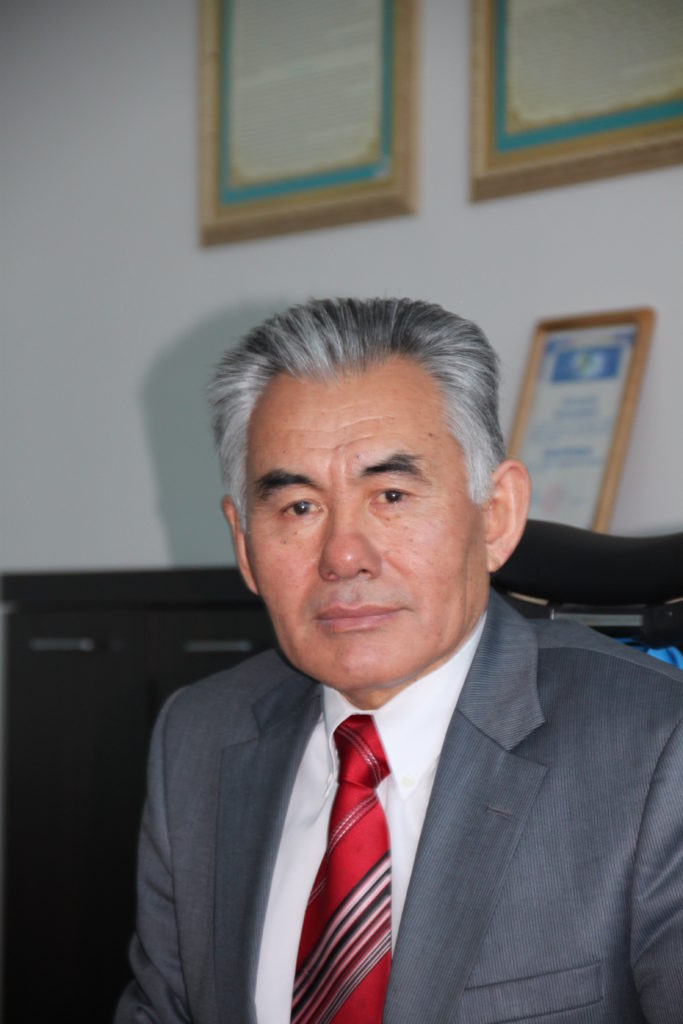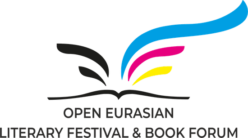Страна : Казахстан

Дандай Искакулы родился 27 мая 1946 года. Старший преподаватель, доцент, профессор, заведующий кафедрой (1977-2000 гг.) В Казахском национальном университете им. Аль-Фараби, профессор Евразийского национального университета им. Л.Н. Гумилева (2000-2004) , С 2004 года проректор,советник Университета Демиреля.
Защитил диссертацию на тему «Казахская литературная критика 1930-х годов», «Научные основы казахской литературной критики» (1994).
Д. Искакулы является автором семисот статей, посвященных различным проблемам казахской литературы и искусства, 27 больших и малых книг.
Запущенная в Берлине c издательским домом Lembrants “Тілдер тоғысындағы түркі әлемі” – 622-страничная книга охватывает широкий спектр языковых и литературных явлений в глобальной культурной жизни современной эпохи глобализации с социальной, филологической точки зрения, языковой образ мира, судьбу тюркских языков, включая судьбу казахского языка, его прошлое и современное состояние, научно дифференцированы от их общих духовных ценностей. Общий язык, язык, термины, культурное и литературное наследие тюркских народов будут широко обсуждаться.
Главный редактор журнала «Демирель», редактор журналов «Казахская и мировая литература», «Турмагамбет» и член правления Международного общества казахского языка.
Д. Искакулы является членом Союза писателей Казахстана и Союза журналистов Казахстана; Академик Международной Академии Айтматова, Академии Гуманитарных наук Республики Казахстан.
Д. Искакулы является обладателем ордена “Курмет” (2017); Его награды: за большой вклад в развитие системы высшего образования страны и долгосрочные успехи в написании учебной литературы Золотая медаль Байтурсынова, медаль «За заслуги в развитии науки Республики Казахстан» (2016 г.), медаль ТЮРКСОЙ за заслуги в изучении тюркского мира, медали Машхура Жусипа и Султанмахмута Торайгырова. За вклад в развитие Национального университета Казахстана он был награжден медалью «Казахскому национальному университету имени аль-Фараби 80 лет» (2014); присуждена премия имени Культегина за выдающиеся достижения в области тюркологии (2018 г.); Почетный профессор Илийского педагогического университета (Китай, 2016), почетный гражданин Отырарского района Туркестанской области.
Есть научно-образовательная книга под названием «Белес» (2010).
Country : Kazakhstan
Danday Yskakuly was born on May 27, 1946. Senior Lecturer, Associate Professor, Professor, Head of the Department (1977-2000) at the Kazakh National University named after Al-Farabi, Professor at the LN Gumilyov Eurasian National University (2000-2004) was. Since 2004 a Vice Rector, Advisor to the University of Demirel.
He defended his dissertation on the theme “Kazakh literary criticism of the 1930s”, “The scientific bases of the Kazakh literary criticism” (1994).
D. Yskakuly is the author of seven hundred articles devoted to different problems of Kazakh literature and art, 27 large and small books.
Launched in Berlin, by the European Lembrants publishing house “The Turkic World at Languages Intersection”. The 622-page book covers a wide range of language and literary phenomena in the global cultural life of the modern globalization era from the social, philological point of view, the linguistic image of the world, the fate of the Turkic languages, including the fate of the Kazakh language, its past and current state, scientifically differentiated from their common spiritual values. The common language, terms, cultural and literary heritage of the Turkic peoples are widely discussed.
Editor-in-Chief of the Bulletin of the Journal of Demirel, the editor of the magazine “Kazakh and world literature”, “Turmagambet” and the board member of the International Society of Kazakh Language.
D. Yskakuly is a member of the Union of Writers of Kazakhstan and the Union of Journalists of Kazakhstan; Academician of the International Aitmatov Academy, Academy of Humanities of the Republic of Kazakhstan.
D. Yskakuly is the owner of the Orden “Kurmet” (2017); For his great contribution to the development of the country’s higher education system and long-term success in writing educational literature, A. Baitursynov Gold Medal, medal “For merits in the development of science of the Republic of Kazakhstan” (2016), Medal of TURKSOY for his merits in studying the Turkic world, Medals of Mashkhur Zhusip and Sultanmakhmut Toraigyrov. For the contribution to the development of the National University of Kazakhstan he was awarded with the Medal “Al-Farabi Kazakh National University 80 years” (2014); awarded the Kultegin Prize for outstanding achievements in the field of Turkology (2018); Honorary Professor of the Ili Pedagogical University (China, 2016), Honorary Citizen of Otyrar district of Turkestan Region.
There is a scientific and educational book entitled “Beles” (2010).
The issue of “mankurt” in Chingiz Aitmatov’s works
The name of “mankurt» already exists in Kazakh. Its definition is “lack of mind and low consciousness in people”. It is an ancient way of thinking that our ancestors did not let mankurts be appeared on the way for the nation to develop as a nation. Praising and glorifying the sons and daughters who serve the people and nation, and about another grouping people, those who moved away from the country and from the land, called them unscrupulous, and the next generations were left with some tales and legends about them. One of such legends was reflected in the story “Kuy”(melody by dombra), written by A. Kekilbayev in the sixties. For the first time in the period of politics of Russianization of the Soviet empire, the notice by a Kazakh writer about the realization of the issue of mankurtism became apparent. It was the first time among the intelligentsia to describe its consequences, and the public was warned, it was a part of the philosophy of Abish’s creativity, further, who became one of the most prominent Kazakh writers. The policy of eliminating of nationalization of other peoples under the Soviet empire has officially set out to create a new type of “Soviet people”, by whom they intended to build communism. In fact, it means that there were more than 200 ethnic groups in the USSR, that were targeted to be destroyed and intended to be formed a new Russianized nation.
When we have taken our independence and embarked on a path of national development, when we have made efforts to return to its roots our enough Russianized national identity, faced with the unprecedented wind of globalization. The intensity of the globalization that has hit the whole world is so intense that it poses a threat to future of our nation. Like a tsunami bypassing the seafront, public storm – globalization is continuously destroying the world’s national structure. “The purpose of globalization is to shift the people from history, tradition, customs, and change their attitude to the world. Ideology of globalization suggests that the younger generation as a mankurt only cares about the food, the garments. “- R. Berdybay.
What is “mankurt”? In general, the Kazakh word for “mankurt” is derived from Kyrgyz’s “mang”, “man gyroo”, Mongolian “mangar”, “mangoo”, “mangart(a)”, “mangoor (a)”, Tuvanian “ mangyr”, “ mangy” , its meanings ” foolish “,” epic “,” forgotten “or” neglected “in most Turkic languages. Later, the mankurts became “evolved”, and the most developed of them – “kozkamans” were born. Academician Rakhmankul Berdybay distinguished “mankurt” and “kozkaman” as follows: “mankurts and kozkamans are two different phenomena. In addition, the kozkamans are not mad ones. These maybe those who have graduated from high school, university or have taken high positions. Some of them are good at spelling out the history and philosophy of many countries; they may talk non –stop about justice, human rights, civilization, friendship, peace. The more interesting point is, in fact, some ones who seem flawless, cheerful, and more intelligent than others do, as if they take a decision about the world’s fate. Nevertheless, their illness, which requires an indefinite or long-lasting treatment – lack of interests to learn the native people’s traditions. They can seem literally patriotic, and coming out of the country, they can find a lot in common with the opponents of the state. They can betray their country by selling ultimate interests of the people, and be in one boat with the ones, the worst of all those who are desperate for the loss of independence, by relying on them, and hurt our honor. Kozkamans – enemies who intentionally attack on our independence. “
The Kazakh people, who were on the path of independent development, set the task of spiritual renovation to restore their national identity. The direction of this route is “The spiritual revival of a society that has been revived is deeply rooted in its history. The most important condition for a new type of renewal is to maintain that national code. Without it, it is easy for a revival to become an echo. However, it is clear that in order to preserve the national code, it is impossible to put all the good and the bad in you, the confidence that will build on the future, the qualities that will move forward, the habits that will move back and hinder should not be kept within the national consciousness. It is necessary to be able to turn the ancient traditions into the most important preconditions for successful modernization. If the revival fails to get the national-spiritual roots of the country, it will start to err. “(N. Nazarbayev).
Fiction is an abundant ideological weapon. The writers were able to use the power of the pen because of the inability to fight openly against the dangerous policy that threatens the future of the nations. Even though the Soviet ideology was at the forefront, the well-known Kyrgyz writer Chingiz Aitmatov dared to do the same for creative and civic feat.
Ch. Aitmatov’s novel “The Stormy Station” (1980) reveals that one of the most dangerous phenomena in the society is the mankurting issue, that is, the consciousness of the human being has declined and began to suffer from spiritual cataclysms. Describing the magical manifestation of the Kazakh legend that a mankurt shot his mother who gave a birth to him, the writer drew the attention of the public to the fact that the tragedy of this individual in the new era was becoming a common, national tragedy that the whole nation began to forget the language, gene, and religion.
The notion of mankurt was appeared first in the sixties by the well-known Kazakh writer Abish Kekilbayev. Abish’s mankurt -, Kazakh prisoners kept by Turkmens, during the attacks between two neighboring countries, in Mangystau. First of all, the prisoners’ hair were cut fully, then were put a wet piece of breadth from the outcrop of a young camel on their heads as they could not able to take of: “The fresh wet warm piece of breadth from the outcrop putting on the head without hair is glued easily. The detainees do not understand what it is and they are still looking around with fright… “(A. Kekilbayev, Steppe Ballads, Volume 1, 2001, Almaty, p. 206).
Chingiz’s mankurt – the opposite of Abish’s mankurts, who is not like a stupid man, and not as a madman, on the contrary they do know a lot in this life, they consider themselves they do know everything, as their outlook is superior to others, as they think themselves better than others, and their nation, they are ashamed of their nation. He portrayed him as a dangerous social phenomenon and a major force that threatened the spiritual development of the entire human race. Abish’s mad prisoner mankurt is not as horrible as another type of mankurt, who does not want to know his ancestors though he knows them, he does not think about past and present, and future, though he thinks of them, his nose is lifted up to the sky, soul mankurt. The mankurts’ number in the «Kuishi (Dombra melody player)” is, first, only a few (six). Secondly, they are forced to become mankurts. Third, only they suffered from mankurting themselves. In addition, in the Kyrgyz writer’s work, the appearance of mankurts began to appear more frequently, and the consequence was that the consequences were not only to him, but also to others, to the society and to the future. More importantly, the spiritual roots of the new era mankurts are emerging and growing in society. It is interesting to note that the nation has been preparing the nation’s leaders, at the same time; mankurts are brought up that hinder the national development of that society.
Despite the pressures of his time, Chingiz Aitmatov was able to convey artistically well the most dangerous issue in human destiny, to the people that could understand the power of the word.
A. Mendeke commented: «The thoughts are deep. By several times reading of the novel and thinking thoroughly, at last, I found it. National soil, National aroma, National scent was lack of it.”
The novel has been a major issue for the human society. Indeed, this novel is not just a novel; it is not only a writer, but also a public figure called Aitmatov of Humanity, a great value to the western model of social development by great Kyrgyz Chingiz. In the last part of the novel, Philophei’s diary contains the main ideas of the writer. “After all, in fact, I was an X offspring, albeit naturally born, but just like that, without a kind, without a tribe, unbending, unperturbed, not to say, heartless in his actions, glorifying a tough specialist in his field, a man who did not spray his abilities and time nothing more than purposeful activity”. The ideological core of Aitmatov’s work, the command of the world, “Do not be drowsy”.



 (4 оценок, среднее: 4,75 из 5)
(4 оценок, среднее: 4,75 из 5)